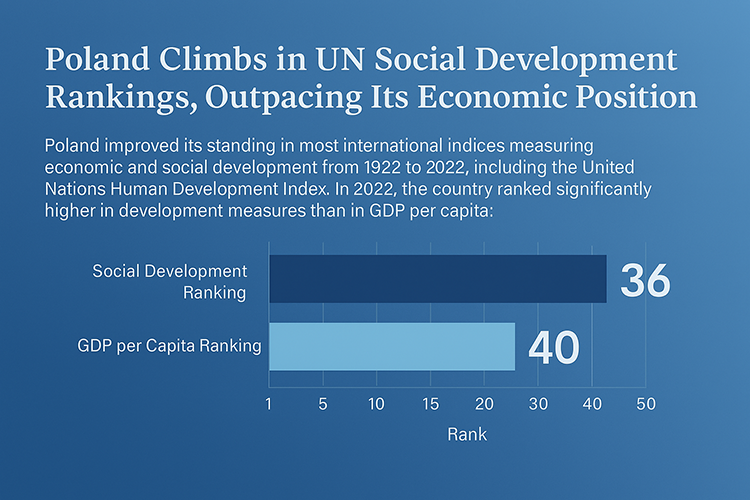Poland climbs in UN Social Development rankings, outpacing its economic position
Between 1990 and 2022, Poland improved its standing in most international indices measuring economic and social development. According to the United Nations Human Development Index (HDI), the country advanced from 45th place in 1990 to 36th place in 2022. This position is notably higher than where Poland ranks based solely on its economic output. For instance, in the 2022 GDP per capita rankings (adjusted for purchasing power parity), Poland was 40th among 193 countries.
These findings come from a report by the Polish Economic Institute (PIE), titled “Social Development in Poland: Theoretical Foundations and Methodological Assumptions for Measuring Social Development.” The report emphasizes that Poland’s standing in international social development rankings consistently exceeds its ranking based only on economic indicators, particularly GDP. This underscores the limitations of GDP as a comprehensive measure of societal well-being.
The concept of social development, as first defined by the United Nations in 1990, focuses on three core areas: health, education, and standard of living. Since then, broader measures have been adopted. In 2008, the European Commission proposed the inclusion of environmental factors and subjective quality of life. The OECD’s Better Life Index (BLI), introduced in 2011, expanded this further to include areas such as income, employment, health care, social connections, environment, governance, security, and civil rights.
Education, well-being, and health are among the most common components in modern social development indices. Numerous studies confirm that education is closely linked to income, health outcomes, and overall life satisfaction. Similarly, good health supports both educational achievement and workforce participation.
While GDP per capita is still widely used due to its standardized methodology and its general correlation with better life outcomes, the report stresses that GDP alone is not an objective measure of social development. Higher GDP is often associated with longer life expectancy and more years spent in education. However, many social development indicators—such as life satisfaction, housing quality, and social ties—are not directly influenced by GDP growth. In some cases, countries with high GDP may experience rising inequality or stagnating living standards for large parts of the population.
According to Dr. Paula Kukołowicz, head of the sustainability team at PIE, GDP does not account for how wealth is distributed within society. As a result, a country may show strong average economic figures while many citizens experience declining financial conditions. This is particularly evident in some resource-rich countries where economic gains are not evenly shared. Social development, she argues, must be assessed more holistically, especially in developing countries like India, which see rapid economic growth alongside persistent poverty.
Poland’s own experience reflects this distinction. In nearly all major international social development indices, Poland ranks higher than it does in economic rankings. In 2022, the country placed 36th in the UN’s HDI, while it ranked 52nd in GDP per capita and 40th in GDP adjusted for purchasing power. Within the OECD’s Better Life Index, Poland held 24th place overall but was only 29th in GDP per capita.
Education plays a central role in improving Poland’s performance in these rankings. In the BLI’s education category, Poland ranked 6th among 41 countries, behind only Finland, Australia, Sweden, Estonia, and Slovenia. This category evaluates factors such as average years of schooling, performance in international assessments like PISA, and the proportion of the adult population with at least secondary education.
However, Poland scores lower in the health category, which negatively affects its overall social development ranking. Despite these challenges, the country’s steady rise in development indices suggests broader improvements in quality of life that are not fully captured by economic output alone.
Source: PIE









